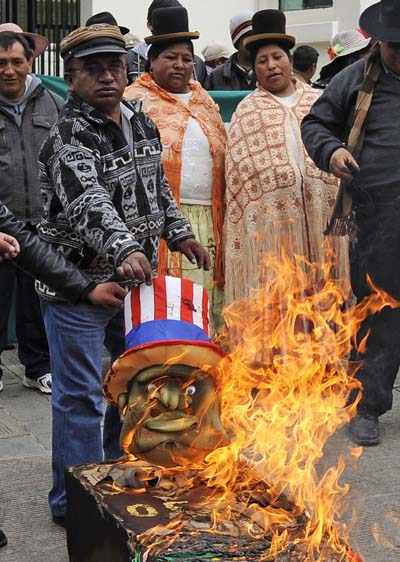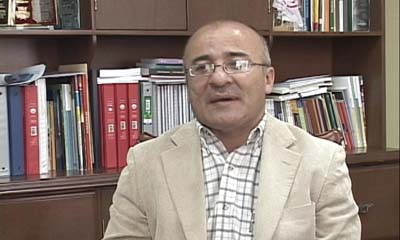By Dalia González Delgado
When Latin Americans listened to Barack Obama's presidential
campaign in 2008, they thought that maybe Washington's foreign
policy towards the region might change.
In 2009, a few months after occupying the Oval Office, Obama tried
to enthuse everyone in the 5th Summit of the Americas in Trinidad
and Tobago. There he shook hands with Hugo Chavez, and said that it
was time to develop a relationship "between equals". "Sometimes
we tried
to impose our conditions," he said. "We
may be wrong, we admit it; we're human."
But that was just a face wash, because, in essence, the White House
policy has not changed. They are still trying to destroy, or at
least slow down all the processes of change in the continent.
The most recent example is what happened with the president of
Bolivia, Evo Morales, who was virtually kidnapped in Europe for
almost 15 hours.
Granma consulted Hugo Moldiz Mercado, a Bolivian
academic, lawyer, broadcaster and specialist in International
Relations.
Do you think that the European governments acted voluntarily, or is
it true that the U.S. was behind it all?
"Within a week of this event,
that will be
a milestone in world history of the decline of international order,
it can be said that the United States was from the beginning behind
the operation mounted against President Evo Morales. First, they are
the only ones concerned about the revelations that Edward Snowden
could keep making about mega-operations of the U.S. secret services
in the world, which violate the privacy rights of its own citizens
and even of European countries. "
"Moreover, the U.S. is the only one with a leadership able to align
all its NATO partners in an operation such as was developed on July
2. Another reason to think that they are responsible is the
information that is beginning to emerge in Austria, where Die
Presse, a very serious newspaper, revealed that the U.S.
ambassador to the country was the one who started a rumor that
Snowden was on Evo Morales’
presidential plane ".
In your view, how will this incident affect relations between
Bolivia and the United States?
"Bolivian-US relations are in the process of deterioration. This is
due to the constant interference of the embassy of the United States
and its intelligence agencies in our domestic affairs, either
overtly or covertly, through, for example, the U.S. Agency for
International Development (USAID) and the National Endowment for
Democracy (NED) ".
"Since 2008, when Bolivia expelled Ambassador Goldberg for
encouraging right-wing conspirators in their undemocratic desires,
the links have not improved. the Framework Agreement signed between
the two countries less than two years
ago
to build state-to-state
relationships of mutual respect, non-interference and shared
responsibility in the fight against drug trafficking, has not been
fulfilled by the United States, which keeps pressing the country.
Revelations in the Bolivian weekly La Epoca report covert
actions in
Bolivia by the CIA and the U.S. anti-drug agency DEA. "
What do you think about the reaction of Latin America to what
happened?
"The reaction has been generally positive. Outrage has been
categorical by peoples and
also by many states
and governments. I believe that the attack on Evo Morales has been
taken as an aggression against all of Latin America. Of that there
is no doubt ".
"But the United States is operating in the region with more force
than before, and has tried at least to minimize what happened. At
the meeting of UNASUR in Bolivia, it is quite suggestive that the
presidents of Colombia, Peru and Chile - the three most involved in
the Pacific Alliance project, which is the return of the FTAA by
another name- did not attend."
La Habana, miércoles 10 de julio de 2013. Año 17 / Número 191
|
 Manifestación
de bolivianos frente a la embajada de Estados Unidos en
La Paz.
Manifestación
de bolivianos frente a la embajada de Estados Unidos en
La Paz.  Hugo
Moldiz, académico boliviano.
Hugo
Moldiz, académico boliviano.